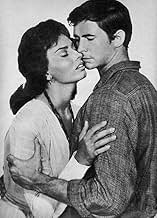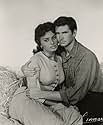IMDb RATING
6.5/10
1.5K
YOUR RATING
Desperation and secret passions on a family farm lead to tragedy.Desperation and secret passions on a family farm lead to tragedy.Desperation and secret passions on a family farm lead to tragedy.
- Nominated for 1 Oscar
- 3 nominations total
Rebecca Welles
- Lucinda Cabot
- (as Rebecca Wells)
Edna Bennett
- Housewife Gossip
- (uncredited)
Florine Carlan
- Young Girl
- (uncredited)
Robert Cass
- Seth
- (uncredited)
- …
Vera Denham
- Farm Woman
- (uncredited)
Harvey B. Dunn
- Farmer
- (uncredited)
Dick Elliott
- Old Farmer
- (uncredited)
Jamie Forster
- Farmer
- (uncredited)
Greta Granstedt
- Men
- (uncredited)
Sandra Harrison
- Young Girl
- (uncredited)
- Director
- Writers
- All cast & crew
- Production, box office & more at IMDbPro
Featured reviews
When "Desire Under the Elms" came out at the end of the 1950s, it was dismissed by critics who were more interested in parading their education and artistic credentials than in assessing the movie sensibly. In particular, they commented on how far the film fell short of the original stage play. Nearly fifty years later, a more balanced perspective is possible.
Regardless of how it compares with the theatrical original, "Desire Under The Elms" works successfully as a dramatic movie. There is real tension as the drama unfolds, and the audience feels a sense of horror when it realises what Anna (Sophia Loren) is going to do to prove her love. The resolution is genuinely tragic, and this is reinforced by the fact that the two lovers were unlikable people until love entered their lives and gave them humanity and consideration for others.
The acting is quite good all round, and presumably much of the credit goes to the director Delbert Mann. (Some of his other films during this period were also well-acted: "The Dark At The Top Of The Stairs"/"The Bachelor Party"). Sophia Loren is a real surprise. I have never worshipped at her throne, but she is excellent in this movie, playing a greedy, calculating woman who marries a much older man merely to have a comfortable home. At the beginning, her venality and disregard for other people make her highly unpleasant, and she is not particularly attractive physically either. As love gradually dominates her, she becomes physically very attractive - her fans, no doubt, will say she becomes beautiful - until the circumstances she has helped create imprison her. Then once again, her physical allure subsides and she becomes gaunt and drawn. Obviously this play with Sophia Loren's looks was a joint effort, and presumably the camera department, costume department and make-up department all deserve credit.
Daniel L. Fapp's Vista-Vision cinematography is crystal clear and a major asset. The film's only big failing is the blatant artificiality of the back drops. "Desire Under The Elms" was obviously made in a studio.
Regardless of how it compares with the theatrical original, "Desire Under The Elms" works successfully as a dramatic movie. There is real tension as the drama unfolds, and the audience feels a sense of horror when it realises what Anna (Sophia Loren) is going to do to prove her love. The resolution is genuinely tragic, and this is reinforced by the fact that the two lovers were unlikable people until love entered their lives and gave them humanity and consideration for others.
The acting is quite good all round, and presumably much of the credit goes to the director Delbert Mann. (Some of his other films during this period were also well-acted: "The Dark At The Top Of The Stairs"/"The Bachelor Party"). Sophia Loren is a real surprise. I have never worshipped at her throne, but she is excellent in this movie, playing a greedy, calculating woman who marries a much older man merely to have a comfortable home. At the beginning, her venality and disregard for other people make her highly unpleasant, and she is not particularly attractive physically either. As love gradually dominates her, she becomes physically very attractive - her fans, no doubt, will say she becomes beautiful - until the circumstances she has helped create imprison her. Then once again, her physical allure subsides and she becomes gaunt and drawn. Obviously this play with Sophia Loren's looks was a joint effort, and presumably the camera department, costume department and make-up department all deserve credit.
Daniel L. Fapp's Vista-Vision cinematography is crystal clear and a major asset. The film's only big failing is the blatant artificiality of the back drops. "Desire Under The Elms" was obviously made in a studio.
Ephraim Cabot is an old man of amazing vitality who loves his New England farm with a greedy passion. Hating him, and sharing his greed, are the sons of two wives Cabot has overworked into early graves. Most bitter is Eben, whose mother had owned most of the farm, and who feels who should be sole heir.
This is a great cast all around, with Burl Ives and Sophia Loren. But Anthony Perkins is the star of the show and really excels as a conflicted son and love interest. Over the years, he has become increasingly synonymous with Norman Bates, but films like this show he is more versatile than his later horror career suggests.
I wonder how audiences viewed the morals of this film in the 1950s. While not quite incestuous, there is a very questionable morality. If not from the son, at the very least from a wife who is romantically linked to two generations of the same family.
This is a great cast all around, with Burl Ives and Sophia Loren. But Anthony Perkins is the star of the show and really excels as a conflicted son and love interest. Over the years, he has become increasingly synonymous with Norman Bates, but films like this show he is more versatile than his later horror career suggests.
I wonder how audiences viewed the morals of this film in the 1950s. While not quite incestuous, there is a very questionable morality. If not from the son, at the very least from a wife who is romantically linked to two generations of the same family.
If you imagine yourself in a 1950s New York theatre surrounded by American anti-Communists wearing narrow ties and wanting to be cultured, you'll be able to connect with this wooden, would-be Greek tragedy. If not, don't go there, and get on board with TV's the Cartwrights, who seem to inhabit identical territory and period because they were performing almost simultaneously for an audience thousands of times bigger. It's worth watching for Antony Perkins, who is superbly mixed-up as an anti-authoritarian rebel determined to secure ownership of the family farm, but driven a bit strange by anxiety, paternal neglect and the early death of his mother. See him exit his lover's garden gate, pirouetting as he goes; or spinning in place before rising from his bed. It's so graceful you barely notice. He's like an 11 year-old, changing his mind every five minutes, madly self-conflicted as a result of his irresistible lust for the maid, sorry, his father's third wife. Sophia Loren is powerful in this picture, if you can follow her English. She really occupies her part and fills her space. The passion between her and Perkins would be almost believable, if it weren't expounded in this stagey setting, with neither Loren nor Perkins exposing any skin, which just adds to the sense of attending a school play. Actually, the basic material of Desire Under The Elms is purely adult, but somehow this production renders it about as sinful as Agatha Christie.
Loren and Perkins smoke up the screen in this black and white, well-done love story. It is fascinating to see how quickly an all-American father and son can be weak for the same foreign woman. Sophia is wonderfully foreign, very talented in an early role. Anthony Perkins and she have surprisingly strong chemistry, the first kiss between them is one of the hottest kisses in the cinema. Burl Ives does an outstanding job as the miserly father who nabs himself a young pretty foreign wife. Sophia makes you believe she is married to Burl, she represents many a foreign wife who have married for economy. Anthony Perkins shocks you with his hatred and rivalry with his father.
After a couple of studio films shot on location, Italian actress and sex symbol Sophia Loren finally made it onto Hollywood soil for this uneven, uncertain melodrama adapted from Eugene O'Neill's controversial play. A tyrannical New England farmer (Burl Ives), who apparently worked his past two wives to death, brings home a new wife to meet his sons--two of whom take off for California and the third (Anthony Perkins) who stays and eventually falls in love with the Mrs. The performers seem to be at a mismatch with this very strange material; though they try hard, the heavy prose and illogical situations would be enough to defeat anybody. The character motivations aren't always clear, not helped by the narrative which, at a crucial point, jumps ahead in time and nearly alienates the audience. Ives gives a full-throttle, blustery-old-windbag performance which infuses the scenario with a prickly tension (and the screenplay surprisingly never scores points against him), but glinty-eyed Loren is a bit out of her depth. Still, she survives the absurd final reel with her dignity intact, while the picture ends on such a dour note that the overall impression is one of supreme dissatisfaction. Daniel L. Fapp won an Oscar nomination for his handsome (if overlit) photography; Delbert Mann directed in an awkward and stagy fashion. **1/2 from ****
Did you know
- TriviaThe original 1924 Broadway production made Walter Huston a Broadway star; he was 40 years old, playing a septuagenarian. He was later in several more Eugene O'Neill plays.
- GoofsIn several outdoor scenes, people cast two (or more) shadows showing that there are two light sources.
- ConnectionsFeatured in Biography: Sophia Loren: Actress Italian Style (1997)
- How long is Desire Under the Elms?Powered by Alexa
Details
- Runtime1 hour 51 minutes
- Color
- Aspect ratio
- 1.85 : 1
Contribute to this page
Suggest an edit or add missing content




















